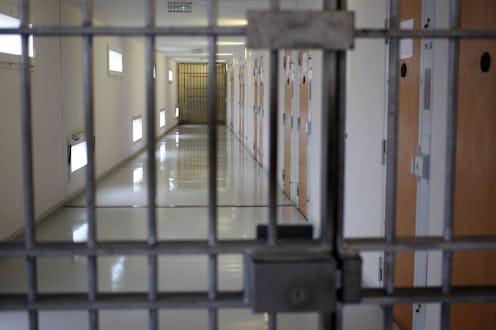News
We Need To Talk About Bail Reform
Between President Obama making a historic visit to a federal prison in July, and Democratic presidential candidates advocating for reducing mandatory minimums for drug crimes, criminal justice reform became a much larger national discussion. However, a major part of the criminal justice system perpetuating the nation's mass incarceration problem is often ignored — the pretrial system, or what happens to people after they're arrested but before their case goes to trial. In order to decrease the number of Americans behind bars and create a more just criminal system, we need to talk about bail reform — because the inability to pay bail shouldn't keep poor Americans behind bars.
There are currently 2.2 million people behind bars in the U.S., about 700,000 of which are in local jails, not federal or state prisons, according to the Bureau of Justice. What's really alarming, however, is that more than 60 percent of people in jails haven't been convicted of a crime, and nine in 10 inmates who remain in jail before their trial are there because they haven't posted bail.
"They're there because they can't afford to buy their release," says Brandon Buskey, staff attorney with the ACLU's Criminal Law Reform Project.
The current monetary bail system, known as money bail, keeps people who can't afford to pay behind bars for months — sometimes years — before they've even been convicted of a crime. If a key principle of the U.S. criminal justice system is that defendants are supposed to be innocent until proven guilty, then why are hundreds of thousands of Americans sitting in jail awaiting their right to a fair trial?
Not only are jails overcrowded with people waiting to go to court, which costs an average of $60 per day per inmate, those who serve time pretrial are more likely to accept a plea deal and face harsher punishments when they finally go to trial. According to research by the Pretrial Justice Institute (PJI), defendants who stay behind bars before their trial are four times more likely to be sentenced to time in jail and receive sentences that are three times longer on average than those who post bail. Similarly, people facing prison time are three times more likely to be sentenced if they're held pretrial and are given sentences that are twice as long.
Because of this, the current bail system contributes to mass incarceration on every level. PJI estimates that pretrial incarceration wastes $9 billion taxpayer dollars each year, but it could be much higher if the costs associated with the subsequent increase in jail and prison sentences were factored in. "[It] has serious repercussions for the costs related to this part of the machine, more than the costs associated with prisons," says Cherise Fanno Burdeen, executive director of PJI.
As with the entire criminal justice system, the bail structure disproportionately affects Americans of color who are more likely to be arrested and less likely to be able to pay bail. Because people of color make less on average than their white counterparts and face higher rates of unemployment and poverty, posting bail is more of a financial strain. The money bail system is thus a piece of the racial justice problem within the U.S. prison system, leading people of color to account for 60 percent of those locked up, but only 30 percent of the population.
Money bail discriminates against poor Americans of every race though, creating a class problem on top of a racial problem. When money is required to get out of jail, the poor are the ones left locked up, while people with more money buy their freedom, at least temporarily. "It becomes purely a matter of a person's ability to pay," says Tara Huffman, director of criminal and juvenile justice at the Open Society Institute of Baltimore.
The issues surrounding bail have remained largely ignored, in part because no one outside the system is involved. When bail is set, defendants don't have access to a lawyer yet, so they have no one to advocate on their behalf or argue for a reasonable bail amount. "There's really no voice for the people being victimized by the system when the violations happen," Buskey tells Bustle. Defendants simply have to accept the bail they're given and sit in jail if they can't come up with the money.
If the goal of criminal justice reform is to create a more fair system that decreases the number of Americans locked up, every aspect of the process needs to be addressed — from arrests, to money bail, to sentencing. Putting new tires on a broken down car doesn't make it run, just as fixing one part of the criminal justice system won't lead to major improvements.
Huffman says: "It's unconscionable, and its part of the system that most Americans, even those in criminal justice system, don't pay enough attention to."
